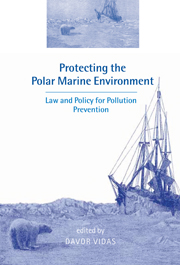Book contents
- Frontmatter
- Contents
- List of figures
- List of tables
- Notes on the contributors
- Preface and acknowledgements
- List of abbreviations
- INTRODUCTORY OVERVIEW
- PART I LEVELS OF REGULATION IN THE PROTECTION OF THE POLAR MARINE ENVIRONMENT
- 1 Globalism and regionalism in the protection of the marine environment
- 2 United Nations Convention on the Law of the Sea and the polar marine environment
- 3 Global environmental protection instruments and the polar marine environment
- 4 The polar marine environment in regional cooperation
- 5 Protection of the Antarctic environment against marine pollution under the 1991 Protocol
- 6 Sub-regional cooperation and protection of the Arctic marine environment: the Barents Sea
- 7 Domestic perspectives and regulations in protecting the polar marine environment: Australia, Canada and the United States
- PART II CURRENT TRENDS AND ISSUES IN PROTECTING THE POLAR MARINE ENVIRONMENT
- Index of international instruments and national legislation
- Subject index
1 - Globalism and regionalism in the protection of the marine environment
Published online by Cambridge University Press: 12 August 2009
- Frontmatter
- Contents
- List of figures
- List of tables
- Notes on the contributors
- Preface and acknowledgements
- List of abbreviations
- INTRODUCTORY OVERVIEW
- PART I LEVELS OF REGULATION IN THE PROTECTION OF THE POLAR MARINE ENVIRONMENT
- 1 Globalism and regionalism in the protection of the marine environment
- 2 United Nations Convention on the Law of the Sea and the polar marine environment
- 3 Global environmental protection instruments and the polar marine environment
- 4 The polar marine environment in regional cooperation
- 5 Protection of the Antarctic environment against marine pollution under the 1991 Protocol
- 6 Sub-regional cooperation and protection of the Arctic marine environment: the Barents Sea
- 7 Domestic perspectives and regulations in protecting the polar marine environment: Australia, Canada and the United States
- PART II CURRENT TRENDS AND ISSUES IN PROTECTING THE POLAR MARINE ENVIRONMENT
- Index of international instruments and national legislation
- Subject index
Summary
This chapter is not concerned with what makes the polar regions different, or with the details of the legal and political regimes and institutions which govern them. Our concern here is the relationship between regional regimes and the broader global context of the law of marine environmental protection. No study of the international law relating to protection of the marine environment can fail to note the interplay of global, regional, sub-regional and national rules and institutions, or the variety of interrelated and sometimes overlapping treaties which deal with the marine environment at these various levels. This phenomenon has been likened to a ‘Russian doll effect’: as one layer of international regulation is peeled away, other layers appear beneath, until eventually the purely national layer is reached.
This portrayal may oversimplify the position of the polar regions, and especially that of the Antarctic. Partly because of the contested legal status of the Antarctic, and partly because of the ambiguities of the 1959 Antarctic Treaty, the relationship between the Antarctic Treaty System and the law of the sea is a complex and uncertain one. Whether these two bodies of law conflict or co-exist is beyond the scope of this chapter, but the question is important to an understanding of the law relating to the protection of the marine environment in polar regions.
- Type
- Chapter
- Information
- Protecting the Polar Marine EnvironmentLaw and Policy for Pollution Prevention, pp. 19 - 33Publisher: Cambridge University PressPrint publication year: 2000
- 4
- Cited by



